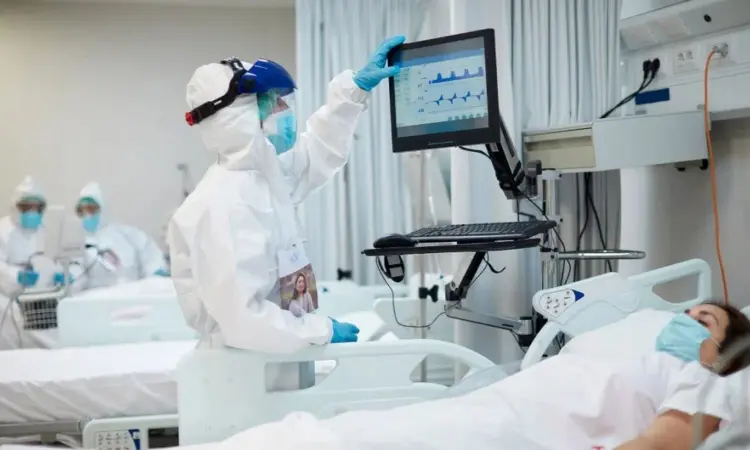- Home
- Medical news & Guidelines
- Anesthesiology
- Cardiology and CTVS
- Critical Care
- Dentistry
- Dermatology
- Diabetes and Endocrinology
- ENT
- Gastroenterology
- Medicine
- Nephrology
- Neurology
- Obstretics-Gynaecology
- Oncology
- Ophthalmology
- Orthopaedics
- Pediatrics-Neonatology
- Psychiatry
- Pulmonology
- Radiology
- Surgery
- Urology
- Laboratory Medicine
- Diet
- Nursing
- Paramedical
- Physiotherapy
- Health news
- Fact Check
- Bone Health Fact Check
- Brain Health Fact Check
- Cancer Related Fact Check
- Child Care Fact Check
- Dental and oral health fact check
- Diabetes and metabolic health fact check
- Diet and Nutrition Fact Check
- Eye and ENT Care Fact Check
- Fitness fact check
- Gut health fact check
- Heart health fact check
- Kidney health fact check
- Medical education fact check
- Men's health fact check
- Respiratory fact check
- Skin and hair care fact check
- Vaccine and Immunization fact check
- Women's health fact check
- AYUSH
- State News
- Andaman and Nicobar Islands
- Andhra Pradesh
- Arunachal Pradesh
- Assam
- Bihar
- Chandigarh
- Chattisgarh
- Dadra and Nagar Haveli
- Daman and Diu
- Delhi
- Goa
- Gujarat
- Haryana
- Himachal Pradesh
- Jammu & Kashmir
- Jharkhand
- Karnataka
- Kerala
- Ladakh
- Lakshadweep
- Madhya Pradesh
- Maharashtra
- Manipur
- Meghalaya
- Mizoram
- Nagaland
- Odisha
- Puducherry
- Punjab
- Rajasthan
- Sikkim
- Tamil Nadu
- Telangana
- Tripura
- Uttar Pradesh
- Uttrakhand
- West Bengal
- Medical Education
- Industry
High blood sugar in hospitalized patients tied to longer length of stay: Study

Chile: A recent study has found that more than half of hospitalized patients are affected by hyperglycemia (high blood sugar) during hospitalization which is associated with a longer length of stay. The study findings appear in the journal Revista Médica de Chile.
Prior to the study, it is known that hyperglycemia is a highly prevalent problem in hospitalized patients and is associated with adverse outcomes. Hyperglycemia may be due to a high rate of obesity, prediabetes, and diabetes. However, about half of the hyperglycemia cases occur in patients without a history of diabetes and may be explained by counter regulatory hormones secreted in response to the stress derived from diseases causing hospitalization, which, in addition, may have therapies complex that generate unwanted metabolic effects.
Against the above background, Bruno Grassi, Pontificia Universidad Católica de Chile, Santiago, Chile, and colleagues aimed to characterize the frequency of hyperglycemia in a tertiary hospital and to correlate it with the length of hospital stay (LOS).
For this purpose, the researchers performed a review of hospitalized patients' medical records. They recorded demographic data and laboratory data, previous diabetes mellitus (DM) history, current main diagnosis, unit of hospitalization and the two highest capillary blood glucose values from the analyzed period for each patient. LOS was obtained from electronic clinical records.
210 subjects, aged 60 ± 19 years (104 women) were included.
Key findings of the study include:
- 54% patients developed hyperglycemia ≥ 140 mg/L. Thirty one percent of these had a previous history of diabetes and 29% had stress hyperglycemia (SHG).
- Patients with a history of DM had a higher average blood glucose than those with SHG (238.9 and 178.2 mg/dL, respectively) and a greater percentage of cases with a blood glucose above 180 mg/dL (72 and 40.0%, respectively).
- Hospital LOS was significantly longer in patients with hyperglycemia ≥ 140 mg/dL as compared with those with normoglycemia (29.3 and 12.8 days, respectively). This association remained significant when introduced in a linear regression analysis including diagnosis, decreased glomerular filtration rate (GFR) and hospitalization unit.
The researchers concluded, "hyperglycemia during hospitalization affects more than half of hospitalized patients and is associated with a longer length of stay."
Reference:
The study titled, "Association of hyperglycemia with the length of stay in hospitalized patients," is published in the journal Revista Médica de Chile.
DOI: https://www.scielo.cl/scielo.php?script=sci_arttext&pid=S0034-98872021000200210
Dr Kamal Kant Kohli-MBBS, DTCD- a chest specialist with more than 30 years of practice and a flair for writing clinical articles, Dr Kamal Kant Kohli joined Medical Dialogues as a Chief Editor of Medical News. Besides writing articles, as an editor, he proofreads and verifies all the medical content published on Medical Dialogues including those coming from journals, studies,medical conferences,guidelines etc. Email: drkohli@medicaldialogues.in. Contact no. 011-43720751


